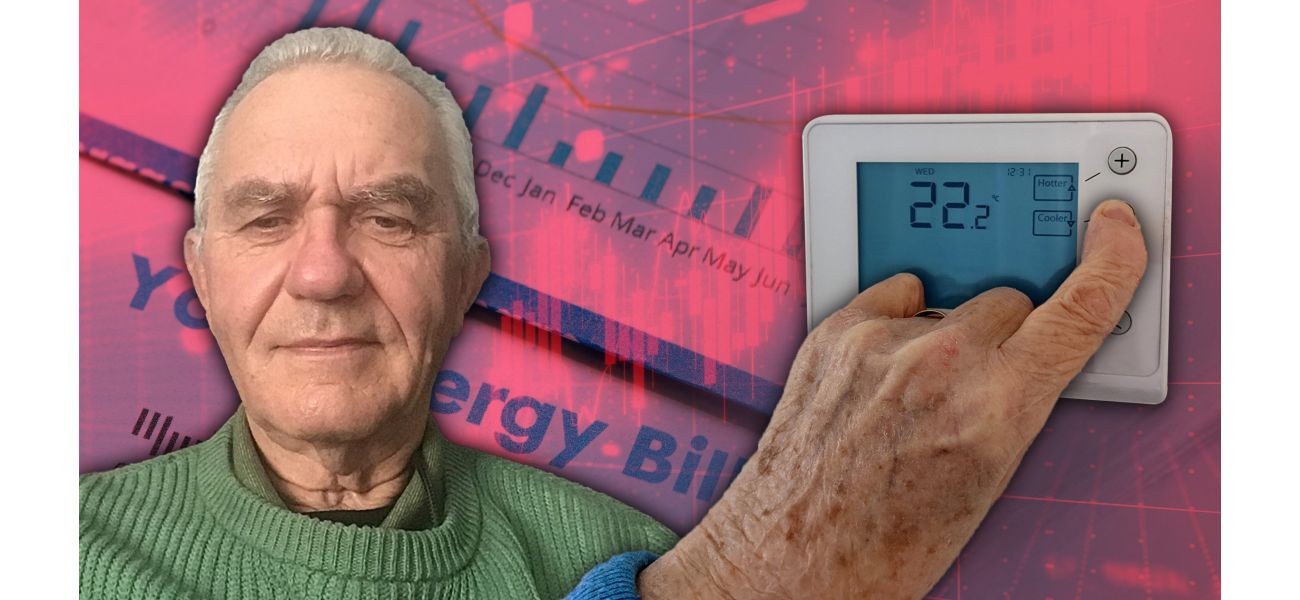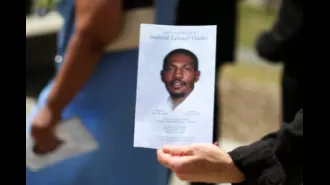Without the Winter Fuel Allowance, I can't afford to heat my home at 74.
The issue has become all-encompassing, surpassing even our food expenses.
October 18th 2024.

Mike Evans, a 74-year-old retired electrician, has lived with his wife in their Worcestershire home for over 20 years. However, this winter, he's feeling more anxious than ever before. The reason? His energy bills have skyrocketed, leaving him and his wife struggling to keep up. Their energy supplier, Octopus, recently estimated that their annual electricity and gas bill will reach a whopping £1,700 - a significant increase from the previous year's £1,400. This is due to the 10% increase in energy prices set by Ofgem, which has resulted in an average bill of £1,717 for households across the UK.
"It's the highest our bills have ever been," Mike tells Metro. "We used to not really think twice about turning on the heating, but now it's a constant worry. It's become bigger than our food bill and everything else. We probably won't be able to afford to have the heating on at all."
Mike is one of 3.9 million vulnerable pensioners facing a harsh winter, according to a recent survey. And unfortunately, he's also one of the millions who will no longer receive the Winter Fuel Allowance. This one-off discount of at least £200 on fuel bills was previously available to 11.4 million retired individuals, but in September, MPs voted to make it means-tested. Now, only 1.5 million vulnerable people over 65 who are on benefits will be eligible for the allowance.
Mike himself just misses the threshold for the Winter Fuel Allowance, meaning he will no longer receive the maximum amount of £300 that he previously received. "I received it when I turned 65, nine years ago. It made a huge difference. We could keep the heating on when needed, and it was comfortable. But now, that's all gone," he explains. "My wife just goes to bed and watches TV to stay warm. It's not just us, there are many others who are worse off. Single people and widows are really going to suffer. For wealthy people, this may not seem like a big deal, but for people like us who receive a combination of private and state pension that puts us just over the limit for any benefits - we're the ones who are struggling."
Mike is disappointed that the Winter Fuel Allowance, which was introduced by the Labour party in 1997, is now being restricted. "I never would have expected the same party to do this decades later," he says. Now, he and his wife are worried about how they will survive the upcoming winter. "We'll just have to keep moving, wrap up warm, and do what we can," he says.
For elderly people like Mike, the cold weather can be especially dangerous. As we age, our immune systems weaken, making us more susceptible to respiratory illnesses and viral infections. These viruses also thrive in cold temperatures, making it even more important to stay warm during the winter months.
In fact, according to a survey by eco-friendly fan manufacturer SpeedComfort, half of people over 65 experience physical discomfort in colder temperatures, and about the same number report a negative impact on their mental health. The survey also found that on average, pensioners expect the temperature inside their homes to drop to 13.9°C this winter. To help those who are worried about staying warm this winter, here are some tips from SpeedComfort:
1. Draught-proof your windows: Check for any gaps or areas where cold air can seep in from the outside, and try to seal them.
2. Keep furniture away from radiators: This may seem counterintuitive, but placing furniture too close to a radiator can actually make the room colder. Radiators are designed to raise the overall temperature of a room, and having furniture in the way can prevent the heat from spreading evenly.
3. Consider installing radiator fans: These can help keep your home warm while reducing energy usage.
4. Use your heating controls wisely: If you have a smart thermostat, use it to set your heating to come on only when you really need it. This can help save energy without sacrificing warmth.
5. Shop around for energy suppliers: Many people in the UK have never switched energy suppliers, but doing so could save you money on your bills.
6. Bleed your radiators: If you notice that one or more of your radiators are not getting warm, there may be air trapped in the system. Bleeding your radiators is a simple fix that can be done at home.
7. Try using a microwave: There are many gadgets available that can provide extra warmth, such as electric blankets or chargeable hot water bottles.
"With temperatures dropping and bills rising, the next few months will be challenging for many households in the UK," says SpeedComfort CEO Wouter Heuterman. "But for older and vulnerable individuals, the thought of being cold at home this winter is particularly worrisome, given the potential health risks."
Mike's home, which he has owned for 23 years, is not well insulated and can easily become cold. Some rooms barely receive any sunlight, making it difficult to warm up. To save money on their bills, Mike and his wife have resorted to turning off appliances and only using the kettle when necessary. "We have a smart meter, and it's scary to see how much it costs," he shares. "Our heating is on a timer, set to 16°C, so our pipes don't freeze. In the evenings, we just use a blanket to stay warm - and winter hasn't even started yet. We're already feeling the effects."
For Mike, his dog Devon is a source of warmth and comfort. His wife, who works as a kitchen supervisor at an NHS hospital, is about a year or two away from retirement and will likely rely on Mike's income. "I can see it getting worse and worse," he says. "But for now, we'll just have to take it one day at a time."
"It's the highest our bills have ever been," Mike tells Metro. "We used to not really think twice about turning on the heating, but now it's a constant worry. It's become bigger than our food bill and everything else. We probably won't be able to afford to have the heating on at all."
Mike is one of 3.9 million vulnerable pensioners facing a harsh winter, according to a recent survey. And unfortunately, he's also one of the millions who will no longer receive the Winter Fuel Allowance. This one-off discount of at least £200 on fuel bills was previously available to 11.4 million retired individuals, but in September, MPs voted to make it means-tested. Now, only 1.5 million vulnerable people over 65 who are on benefits will be eligible for the allowance.
Mike himself just misses the threshold for the Winter Fuel Allowance, meaning he will no longer receive the maximum amount of £300 that he previously received. "I received it when I turned 65, nine years ago. It made a huge difference. We could keep the heating on when needed, and it was comfortable. But now, that's all gone," he explains. "My wife just goes to bed and watches TV to stay warm. It's not just us, there are many others who are worse off. Single people and widows are really going to suffer. For wealthy people, this may not seem like a big deal, but for people like us who receive a combination of private and state pension that puts us just over the limit for any benefits - we're the ones who are struggling."
Mike is disappointed that the Winter Fuel Allowance, which was introduced by the Labour party in 1997, is now being restricted. "I never would have expected the same party to do this decades later," he says. Now, he and his wife are worried about how they will survive the upcoming winter. "We'll just have to keep moving, wrap up warm, and do what we can," he says.
For elderly people like Mike, the cold weather can be especially dangerous. As we age, our immune systems weaken, making us more susceptible to respiratory illnesses and viral infections. These viruses also thrive in cold temperatures, making it even more important to stay warm during the winter months.
In fact, according to a survey by eco-friendly fan manufacturer SpeedComfort, half of people over 65 experience physical discomfort in colder temperatures, and about the same number report a negative impact on their mental health. The survey also found that on average, pensioners expect the temperature inside their homes to drop to 13.9°C this winter. To help those who are worried about staying warm this winter, here are some tips from SpeedComfort:
1. Draught-proof your windows: Check for any gaps or areas where cold air can seep in from the outside, and try to seal them.
2. Keep furniture away from radiators: This may seem counterintuitive, but placing furniture too close to a radiator can actually make the room colder. Radiators are designed to raise the overall temperature of a room, and having furniture in the way can prevent the heat from spreading evenly.
3. Consider installing radiator fans: These can help keep your home warm while reducing energy usage.
4. Use your heating controls wisely: If you have a smart thermostat, use it to set your heating to come on only when you really need it. This can help save energy without sacrificing warmth.
5. Shop around for energy suppliers: Many people in the UK have never switched energy suppliers, but doing so could save you money on your bills.
6. Bleed your radiators: If you notice that one or more of your radiators are not getting warm, there may be air trapped in the system. Bleeding your radiators is a simple fix that can be done at home.
7. Try using a microwave: There are many gadgets available that can provide extra warmth, such as electric blankets or chargeable hot water bottles.
"With temperatures dropping and bills rising, the next few months will be challenging for many households in the UK," says SpeedComfort CEO Wouter Heuterman. "But for older and vulnerable individuals, the thought of being cold at home this winter is particularly worrisome, given the potential health risks."
Mike's home, which he has owned for 23 years, is not well insulated and can easily become cold. Some rooms barely receive any sunlight, making it difficult to warm up. To save money on their bills, Mike and his wife have resorted to turning off appliances and only using the kettle when necessary. "We have a smart meter, and it's scary to see how much it costs," he shares. "Our heating is on a timer, set to 16°C, so our pipes don't freeze. In the evenings, we just use a blanket to stay warm - and winter hasn't even started yet. We're already feeling the effects."
For Mike, his dog Devon is a source of warmth and comfort. His wife, who works as a kitchen supervisor at an NHS hospital, is about a year or two away from retirement and will likely rely on Mike's income. "I can see it getting worse and worse," he says. "But for now, we'll just have to take it one day at a time."
[This article has been trending online recently and has been generated with AI. Your feed is customized.]
[Generative AI is experimental.]
0
0
Submit Comment





